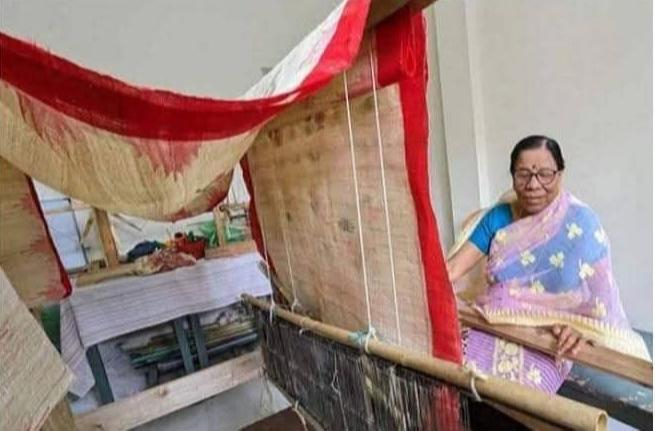Published: 08:03 AM, 15 September 2025
Weaving Sustainability: Radhabati Devi's Banana Fiber Saree Revolutionizes Bangladeshi Textile Industry

Sangram Datta: In the verdant landscapes of Kamalganj upazila in Moulvibazar district, a remarkable transformation in textile artistry is underway, led by the visionary weaver, Radhabati Devi. Her pioneering work in crafting sarees from banana plant fibers has not only introduced an eco-friendly alternative to traditional textiles but also empowered local communities and garnered national recognition.
From Tradition to Innovation:
Radhabati Devi, a skilled artisan from the Manipuri community, has been weaving traditional sarees since 1975. Her journey into sustainable textiles began when she explored the potential of banana plant fibers, traditionally considered agricultural waste, as a viable material for weaving. Through meticulous experimentation, she mastered the art of extracting and spinning banana fibers into yarn suitable for saree production.
The Birth of the 'Kalabati' Saree:
In 2021, Bandarban's the then Deputy Commissioner, Yasmin Parveen Tibriji, initiated a project aimed at utilizing banana plant fibers for handicrafts to promote economic self-sufficiency among local communities. Recognizing Radhabati's expertise, she invited the weaver to Bandarban to spearhead the creation of a full-length saree using banana fiber yarn. Over 15 days, Radhabati meticulously crafted the first 'Kalabati' saree, a name that pays homage to both the banana plant ('kala') and Radhabati herself.
National Recognition and Impact:
The 'Kalabati' saree's significance transcended its innovative material. In July 2023, The then Prime Minister received three such sarees and accompanying handicrafts, symbolizing national acknowledgment of this sustainable endeavor. This milestone not only highlighted the potential of banana fiber in high-quality textile production but also underscored the role of traditional artisans in driving eco-friendly innovations.
Empowering Communities and the Environment:
The success of the banana fiber saree project has spurred economic opportunities in Bandarban and beyond. Local women, trained in banana fiber extraction and weaving, have begun producing various handicrafts, including bags, shoes, and decorative items, catering to both domestic and tourist markets. This initiative not only provides sustainable livelihoods but also promotes environmental conservation by repurposing agricultural by-products.
A Vision for Sustainable Fashion:
Radhabati Devi's innovation exemplifies the fusion of traditional craftsmanship with sustainable practices. Her work demonstrates how eco-friendly materials can be integrated into mainstream fashion, offering alternatives to environmentally taxing textiles. As the global fashion industry grapples with sustainability challenges, initiatives like the 'Kalabati' saree offer a blueprint for environmentally conscious production rooted in cultural heritage.
In weaving banana fibers into exquisite sarees, Radhabati Devi has not only crafted garments but also woven a narrative of innovation, sustainability, and community empowerment that resonates far beyond the looms of Moulvibazar.




